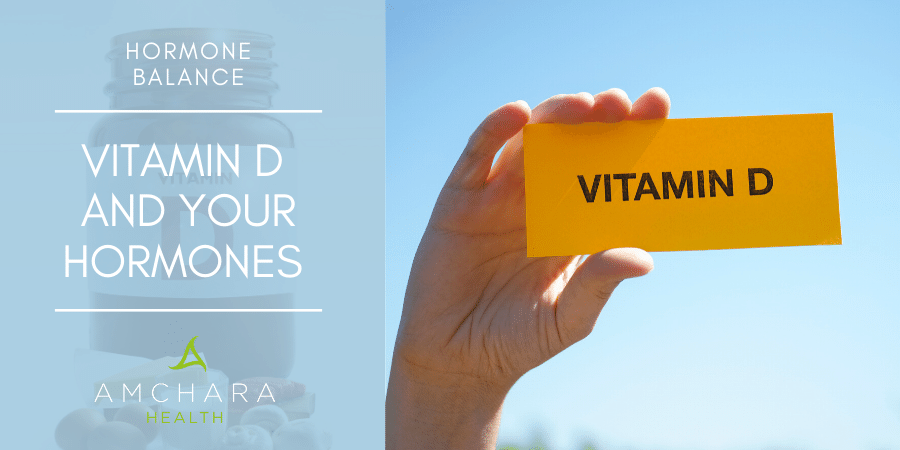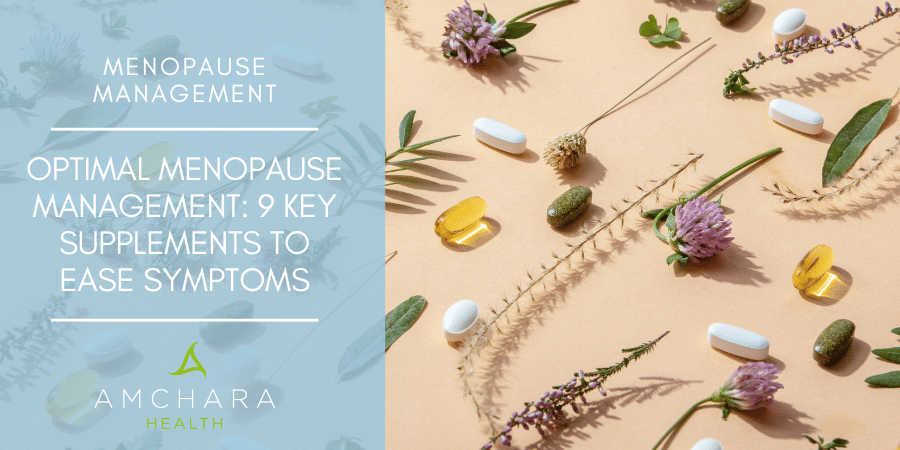Topics Covered in this article:
Vitamin D is unique among vitamins because it acts more like a hormone than a vitamin. Cells all around your body possess receptors able to detect the active form of vitamin D, meaning it can alter the expression of your genes.
Vitamin D is known for its role in controlling inflammation, as well as supporting your bone health, immune system, blood sugar control and blood pressure.
However, its role in hormone balance is less recognised, although since all hormones work synergistically, it is not surprising that vitamin D is intimately connected with hormone balance.
We’re dedicated to providing you with both insightful information and evidence-based content, all orientated towards the Personalised Health approach.
Amchara is excited to announce a new test for Vitamin D available this spring, and this article will focus on the role played by vitamin D in hormone balance.
The crucial role of hormones
Hormones are your body’s messengers – without them, cells in different parts of the body would not be able to communicate with one another.
Hormones are chemicals secreted by special cells directly into the bloodstream. When they reach their target organ or tissue they are recognised by special receptors on the cell, where they co-ordinate processes like metabolism, growth and fertility.
- Vitamin D and insulin
Vitamin D is closely linked to the mechanism by which your body controls the amount of sugar in the blood.
This is because vitamin D is needed for the production of insulin. This hormone tells cells to take in sugar from the blood to use as energy. If vitamin D levels are low, not enough insulin will be secreted.
Vitamin D also plays a role in determining how sensitive your body’s cells are to the message insulin brings to them (1). If cells don’t hear this message, glucose will remain in the blood and more insulin will be released in an attempt to bring it down. Over time, this can adversely affect the functioning of the pancreas.
Vitamin D deficiency is common in those suffering from diabetes and pre-diabetes.
- Vitamin D and thyroid hormone
Low blood levels of vitamin D have been observed in people with poor thyroid function (2).
One study gave vitamin D supplements to people with hypothyroidism (an underactive thyroid gland). The people in the study were not aware whether they were receiving the vitamin D or an inert pill. At the end of the study, blood levels of thyroid-stimulating hormone (TSH) were decreased in the group who were given the vitamin D supplements. High TSH levels can mean the thyroid isn’t making enough of its hormones, leading to symptoms of low thyroid function such as fatigue, memory problems, constipation and dry skin and hair.
Research has found healthy blood levels of vitamin D may reduce the likelihood of developing autoimmune disease. This occurs when the immune system attacks the body’s own tissues. When the immune system mistakenly attacks the thyroid, it can become inefficient at producing thyroxine and this is a common cause of hypothyroidism.
Thyroid autoimmunity is thought to affect between 2% and 5% of the Western population, with more women than men being affected. Vitamin D supplementation has been found to reduce the quantity of circulating antibodies to the thyroid gland produced by the body, which are a measure of autoimmunity (3).
- Vitamin D and sex hormones
Vitamin D appears to influence the levels of both testosterone and oestrogen.
In men, vitamin D deficiency has been linked with low testosterone. In one study, vitamin D supplementation increased testosterone levels by 20% (4). Low testosterone can lead to reduced libido, erectile dysfunction, increased body fat and decreased muscle mass, as well as fatigue and insomnia.
Vitamin D receptors are found in the prostate gland, and this vitamin is understood to play a role in prostate health.
In women, the situation is a little more complex. Elevated oestrogen both in both pre- and post-menopausal women is connected with PMS, fibroids, heavy periods and oestrogen-dependent cancers.
A recent study gave post-menopausal women supplements of vitamin D and discovered that levels of oestrogen – in the form of oestradiol, the strongest type of oestrogen – declined in tandem with increases in blood levels of vitamin D. Elevated testosterone levels also declined (5).
Vitamin D receptors are found in the breast, and studies have linked low levels of this vitamin with a higher risk of death from breast cancer and more aggressive tumours.
On the other hand, science has discovered specific proteins which determine the body’s ability to use vitamin D and oestrogen at the same receptor sites at the same time.
Vitamin D also seems to play a role in the activity of oestrogen. It’s believed vitamin D allows oestrogen to be activated at receptor sites. Without sufficient vitamin D, levels of active oestrogen tend to be low.
In practice, vitamin D appears to have a balancing effect on oestrogen; in other words, it can reduce this hormone if it’s too high and increase it if it’s too low. This may be because vitamin D contributes to the healthy functioning of oestrogen receptors, ensuring they are less sensitive in conditions when oestrogen is plentiful, and more sensitive when oestrogen is scarce. However, more research is needed in this area.
Finally, vitamin D and progesterone are thought to work closely together to regulate the immune system. Progesterone seems to be necessary for vitamin D to be recognised by certain immune cells.
- Vitamin D and stress hormones
A recent study discovered taking a supplement of vitamin D reduced the body’s production of the stress hormone cortisol. In today’s fast-paced world, many people are under constant stress. Although cortisol is needed to help the body deal with stress, continual release of this hormone can lead to weight gain, fatigue, muscle weakness, difficulties in concentration, headaches and high blood pressure.
The study participants not only had lower levels of cortisol after their vitamin D levels were increased, but their blood pressure also reduced and they were able to cycle significantly further without showing signs of physical exertion (6).
How much vitamin D do you need?
Vitamin D is often called the sunshine vitamin – most of your supply will come from exposing your skin to sunshine. It’s also found in oily fish and egg yolks, but not in high levels.
This is why it’s a good idea to get outside when the sun is shining. Vitamin D is produced at a level of sun exposure below that which produces skin reddening and skin damage, so it’s important not to overdo it. However, optimal exposure time will vary with age and skin colour.
Experts suggest the skin is exposed to the sun for between 15 and 20 minutes per day in order to manufacture vitamin D. Vitamin D levels increased in 90% of the participants of one trial after 13 minutes of simulated midday sunshine, when wearing clothes exposing one third of their skin to the sun.
It’s estimated at least one fifth of the UK population are deficient in vitamin D, but up to three quarters may have inadequate blood levels of vitamin D during the winter months.
Recommendations as to the optimum intake of vitamin D vary from country to country, meaning there’s no official consensus on how much is needed. Additionally, everyone is individual in terms of their requirements, because your body’s need for vitamin D is also dependent on your personal lifestyle and any health issues.
The recommended daily requirement in the UK is around 400iu or 10 micrograms, although the maximum safe limit is set much higher at 4000iu or 100 micrograms.
With vitamin D deficiency so common and sunshine often lacking in the UK, it may be advisable to take a supplement if your blood levels of vitamin D are found to be low.
Takeaway
Vitamin D is so crucial to the functioning of cells that any deficiency will affect every part of the body, including hormone balance. Since vitamin D deficiency is so widespread, it’s a good idea to have your levels checked.
Because vitamins and minerals do not act in isolation in the body, a consultation with an Amchara Personalised Health Practitioner will assess your complete nutritional status, including vitamin D.
Our new pinprick blood test can accurately reveal your vitamin D status in just 15 minutes. This enables a personalised dose of supplemental vitamin D to be recommended when appropriate, according to your individual requirements.
Testing to assess your hormone balance may also be beneficial. Individual nutritional and lifestyle modifications can then be recommended to correct any imbalances, and help you achieve your health goals.
We believe sharing knowledge and experience is an important part of achieving optimal health and would love to hear your views and experiences.
Did you find this article useful?
Please share your thoughts in the comments.
Read this next:




